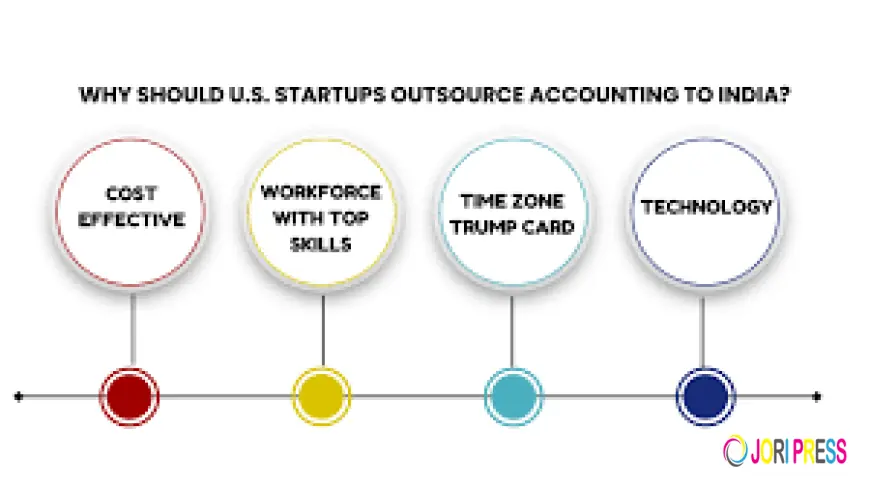Bookkeeping Done Right: Why India Is the Top Choice for U.S. Firms

In an increasingly competitive and fast-paced accounting industry, U.S. firms are under constant pressure to improve efficiency, reduce costs, and deliver timely, accurate financial information to clients. But with rising labor costs and an ongoing shortage of qualified accounting professionals in the U.S., many firms are struggling to keep up.
That’s why bookkeeping outsourcing from India to U.S. firms has rapidly become a strategic solution — not just a cost-cutting measure, but a true game-changer.
By partnering with skilled offshore bookkeeping professionals in India, U.S. firms can streamline operations, expand capacity, and deliver high-quality services at a fraction of the cost. In this blog, we’ll explore how and why this model works, the key benefits, and what firms should know before getting started.
The Rise of Bookkeeping Outsourcing from India to U.S. Firms
India has emerged as a global leader in accounting and financial services outsourcing. With a vast pool of highly educated, English-speaking professionals trained in U.S. GAAP, QuickBooks, Xero, and other cloud-based platforms, India offers a reliable, scalable talent base.
U.S. firms increasingly turn to bookkeeping outsourcing from India because it allows them to maintain control over their operations while delegating time-consuming, routine tasks such as:
-
Daily transaction recording
-
Accounts payable and receivable
-
Bank and credit card reconciliations
-
Payroll processing
-
Month-end close support
-
Financial reporting and data entry
Instead of overloading local staff or hiring costly in-house bookkeepers, firms can delegate these functions to trusted offshore partners and focus more on client-facing and advisory services.
Key Benefits of Bookkeeping Outsourcing India to US Firms
1. Significant Cost Savings
Labor is one of the highest expenses for any accounting firm. By outsourcing bookkeeping to India, U.S. firms can reduce costs by 50% to 70% — without sacrificing quality.
India’s lower cost of living allows qualified professionals to offer their services at a far more affordable rate than their U.S. counterparts. These savings can be reinvested into core business areas such as marketing, client acquisition, staff training, or expanding service offerings.
2. Access to Skilled Talent
India produces thousands of accounting graduates every year, many of whom hold internationally recognized qualifications like CA (Chartered Accountant), ACCA, or even U.S. CPA certifications. Many offshore professionals also have years of experience working with American clients.
Outsourcing gives U.S. firms access to this diverse, high-quality talent pool, enabling them to:
-
Fill skill gaps
-
Handle seasonal workloads
-
Expand services without increasing headcount locally
-
Delegate routine tasks to trained professionals
3. Improved Efficiency and Faster Turnaround
Bookkeeping tasks can be repetitive and time-consuming. Outsourcing them to India allows U.S. firms to optimize workflows and reduce turnaround times.
Thanks to the time zone difference, Indian teams can work while the U.S. office is closed. This enables a near 24-hour work cycle, allowing firms to complete bookkeeping tasks overnight and deliver reports faster to clients.
4. Scalability and Flexibility
One of the biggest advantages of bookkeeping outsourcing from India to U.S. firms is the ability to scale services quickly and affordably.
Whether you need one bookkeeper during tax season or a full offshore team for ongoing support, outsourcing providers can scale up or down based on your needs. This flexibility helps firms:
-
Adapt to business growth
-
Take on more clients
-
Respond to market demands without hiring full-time staff
5. Focus on Strategic Services
When your local staff isn’t bogged down with data entry, reconciliations, or chasing invoices, they can shift their attention to value-added services like:
-
Financial advisory
-
Tax planning
-
Cash flow forecasting
-
Client strategy meetings
This enhances your firm’s service offering, client satisfaction, and revenue potential — all while routine work is handled efficiently in the background.
Why India? Key Strengths of Indian Bookkeeping Talent
Bookkeeping outsourcing to India has grown rapidly because of several unique strengths:
-
Strong Education System: India has a large population of commerce and finance graduates with a deep understanding of accounting principles.
-
English Proficiency: Communication barriers are minimal, as English is widely spoken and used in business.
-
Cultural Compatibility: Indian professionals are experienced in working with Western firms and accustomed to their expectations.
-
Technology Fluency: Indian bookkeepers are well-versed in cloud-based software like QuickBooks, Xero, NetSuite, and Zoho Books.
-
Process Discipline: Indian outsourcing firms follow strict workflows, documentation, and SLAs to ensure accuracy and timeliness.
Common Concerns — and How to Address Them
Data Security and Confidentiality
One of the top concerns for U.S. firms is the safety of client data. Reputable Indian outsourcing providers use secure servers, VPNs, two-factor authentication, and NDAs to ensure full data protection. Many are also compliant with international data privacy regulations like GDPR and SOC 2.
Quality Control
To maintain quality, it’s important to partner with providers who have experienced managers, clear documentation, and quality review systems. Regular reporting, KPIs, and training ensure work is up to U.S. standards.
Communication and Collaboration
With cloud-based platforms, video conferencing, and project management tools, communication is seamless. Daily check-ins, shared dashboards, and instant messaging help offshore and onshore teams stay aligned.
How to Get Started with Bookkeeping Outsourcing to India
Here’s a simple framework to begin:
-
Define Your Needs: Identify which bookkeeping tasks to outsource. Start with non-client-facing, process-heavy work.
-
Choose a Reputable Partner: Look for providers with accounting experience, U.S. client references, and strong data security protocols.
-
Start Small: Pilot with one or two offshore bookkeepers, evaluate performance, and scale gradually.
-
Use the Right Tools: Adopt cloud-based accounting software, secure file sharing, and workflow systems to streamline collaboration.
-
Create Clear Processes: Set expectations, workflows, and quality benchmarks upfront to ensure long-term success.
Final Thoughts
For U.S. accounting firms looking to grow sustainably while maintaining service quality, bookkeeping outsourcing from India is more than a cost-saving measure — it's a strategic evolution.
By unlocking access to skilled talent, reducing costs, increasing efficiency, and freeing up local teams for high-value work, this model offers a powerful way to transform how firms operate and serve their clients.
As more firms embrace remote work and global teams, bookkeeping outsourcing India to US firms is no longer a trend — it’s the future of smart, scalable accounting.
What's Your Reaction?
 Like
0
Like
0
 Dislike
0
Dislike
0
 Love
0
Love
0
 Funny
0
Funny
0
 Angry
0
Angry
0
 Sad
0
Sad
0
 Wow
0
Wow
0


















































